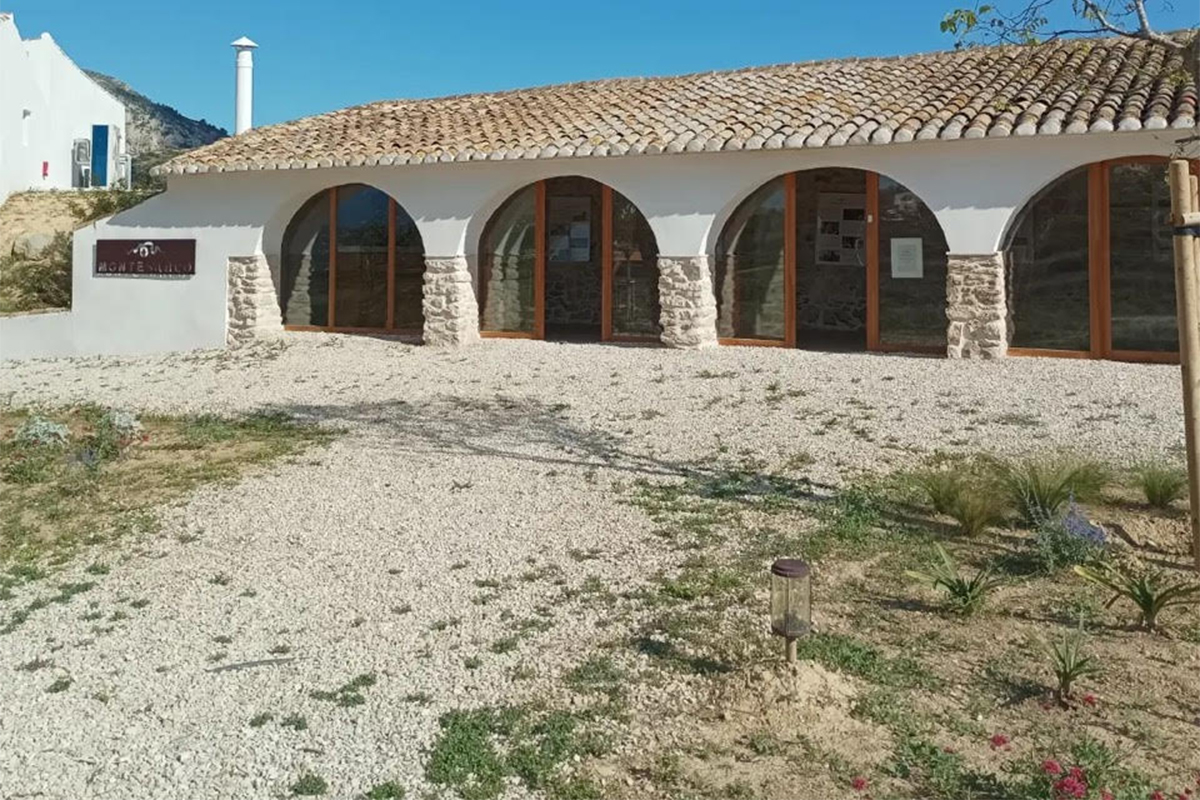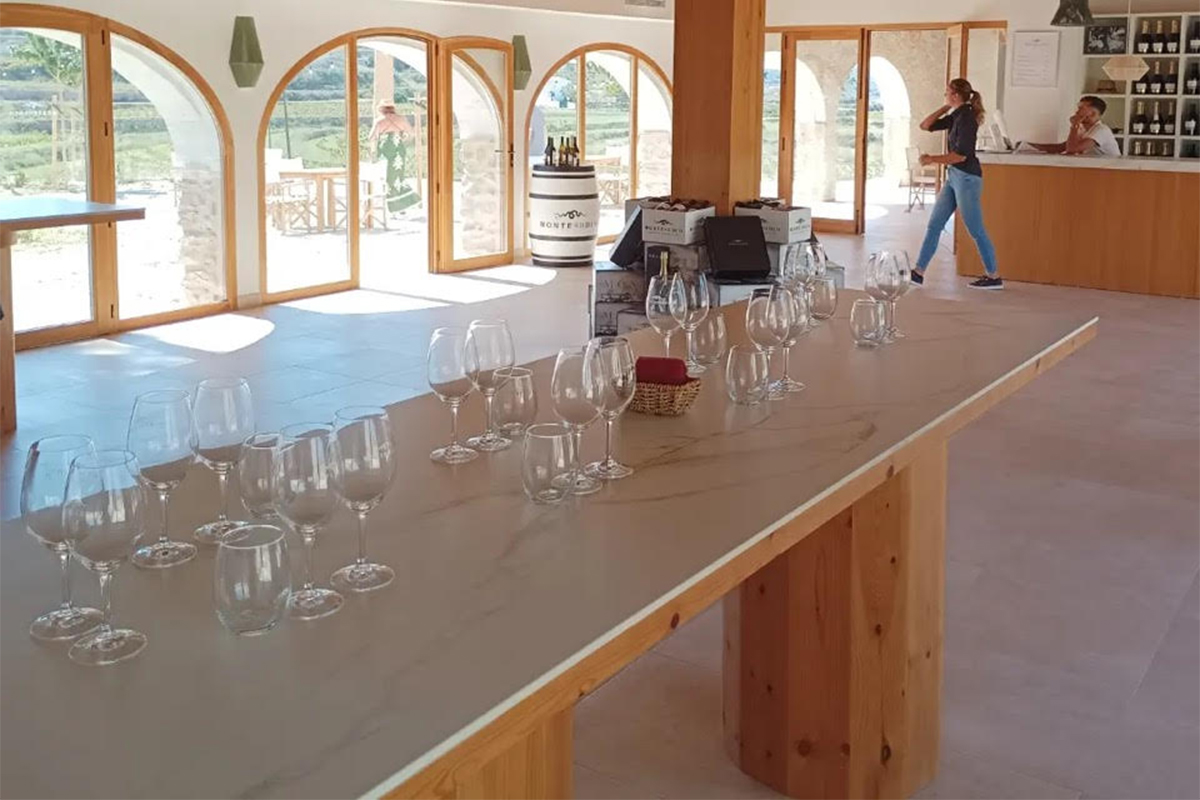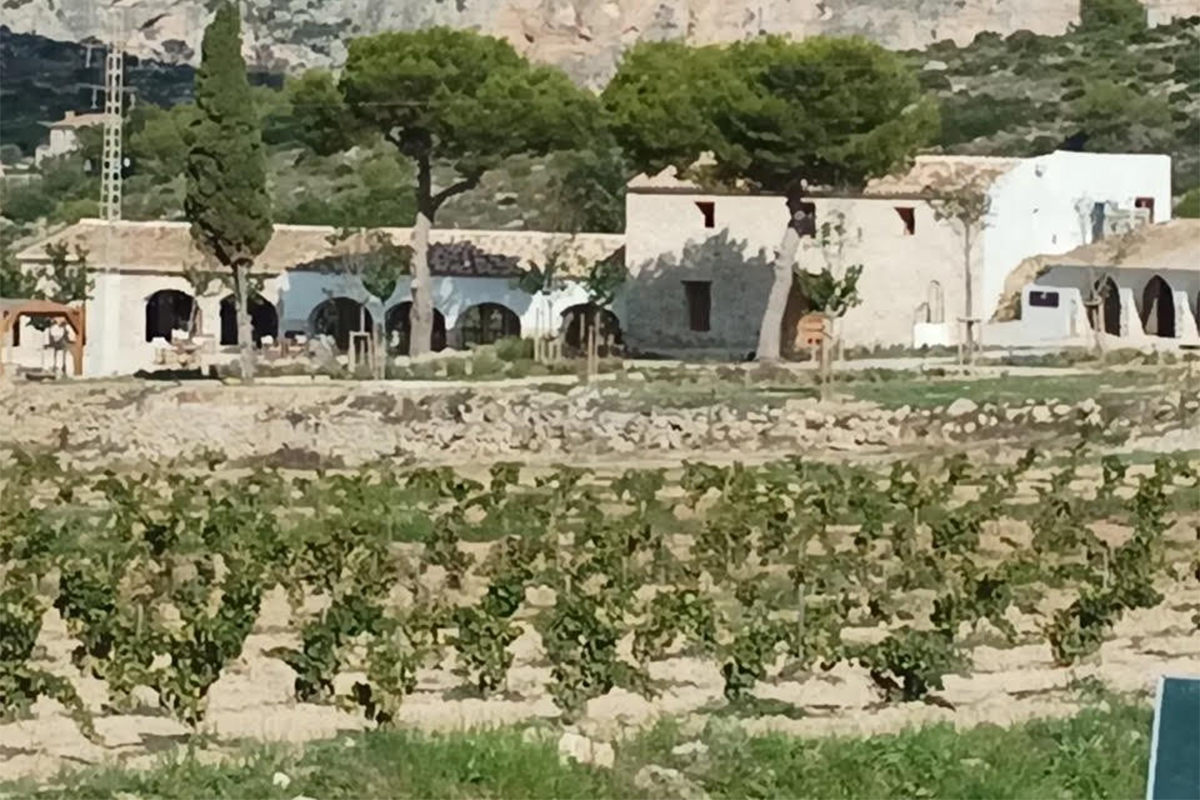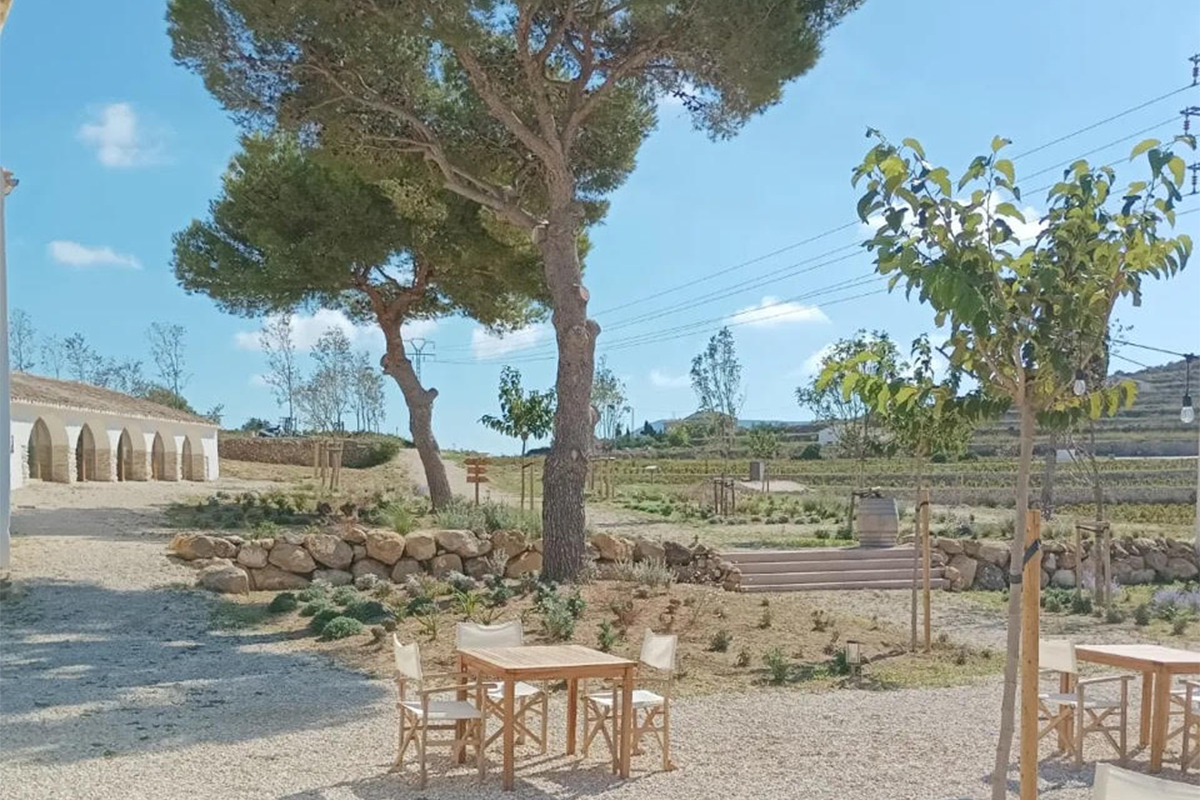18 October, 2023

Colin Harkness / Twitter: @colinonwine / Instagram: colinharkness53 / Facebook: Colin Harkness
The sun had risen into a beautiful, azure coloured sky but a couple of hours before my arrival at Bodegas Montesanco just outside the quiet Marina Alta town, Teulada. I was early. The place was only just opening, however, neither Spanish co-owner, María Sancho, nor Dutch receptionist, Denise were at all fazed. Their smiling welcome was like another sun rising – I felt instantly warmed and at home.
My interview with María was continually punctuated by interjections from myself – I hope I wasn’t too annoying, it’s just that the Montesanco story is so fascinating. Unlike almost all the many bodega owners I’ve met over the last 30 years, María is first generation winery owner. Usually in Spain, bodega owners have inherited their wineries from their parents, who had done the same from theirs and so on.
Wine making and bodega ownership is almost always a family thing. Sometimes, a son, or daughter these days, of course, will start in the family business, learning the ropes, but eventually follow their own course, starting a new bodega, almost always with the approval of their family. However, in María’s case there was no family history of wine making – she started, I was delighted to hear, because she liked wine!
This is normally the way that the rest of us, the hangers-on to the wine trade, start. The writers, the media folk, the wholesalers, the merchants etc start in the business because we like wine. This is certainly the case with myself, with the added incentive of opening a restaurant over thirty years ago and the need to be different to the others in the area. I liked wine, so why not lean more about it and have an advantage over the opposition?
María decided to study winemaking at university. She attracted interest because of her ability, her passion and her desire to get her boots muddy and her hands dirty – making wine. Backed by a small group of business people she took over the Bodega Aranleon in the Utiel-Requena area thirty years ago. Enter, Paco!
María met Paco (good title for a film, no?) during this time. Paco, from a farming family, Valencian oranges in fact, also had no winemaking in his background. However he was similarly imbued with a passion for the land and what it could grow – together they would make a great team.
One day, when touring the vineyards in Utiel-Requena they came across an ancient vineyard they’d seen but never really considered. It was home to centenarian vines, a little overrun, untended and certainly low yielding. However, when tasting the grapes they were overawed by the quality and richness of the juice. Might it be a possibility to make an exclusive wine from just this plot? It surely wouldn’t be commercial, with about a kilo of grapes only from each vine and not that many vines either?
Well, later in the morning of my visit I tasted the fruits of their endeavour, their gamble – and it has certainly paid off. However, I’m getting ahead of myself!

Bodegas Montesanco was established in Utiel-Requena and became successful in an area already making fine wine. I’ve been many times to this Denominación de Origen visiting several bodegas whose red, terracotta coloured soils were producing some excellent wines. In those days Montesanco was probably just a thought, just an idea, an ultimate goal. However, its rapid success led María and Paco to thoughts of expanding, leading them eventually to a 20 hectare plot in the rolling hills outside Teulada.
Bodegas Montesanco, Teulada, was born. The road connecting the countryside with the town and the nearby urbanisation of Les Fonts is called Camí Abiar – indicative of an unknown, at the time, huge piece of fortune for our two entrepreneurs. In these days and unfortunately going into the future too, climate change is a real worry to everyone. Living in Spain, as well as so many other areas of the world, the lack of water is always going to be a major concern. Crops need water, of course, and this includes grape vines.
Abiar is the Valenciano name for fountains! Yes, under the earth that they purchased there are underground springs. The 60 years old Moscatel vines that are planted already on four hectares of the total 20, as well as the 7 hectares of new plantings (local Giró and Garnacha Blanca) are not going to be without water! Bodegas Montesanco is here for the long haul!
It’s a considerable project. María is also an astute businesswoman (probably Paco too, but I’ve yet to meet him). These days bodegas are not just about wine – odd though that sounds. I remember when I first started my small Travel Agency here, Tin Lizzie Tours, my request to bring people by coach to visit the wineries I was visiting for my wine work, was greeted by rather blank faces.
Wine tourism wasn’t at all a thing, almost universally around Spain. These days Enoturismo is a major part of most bodegas, providing much needed revenues for investment and cash flow. Think how long a winery has to wait before it receives any income for the its top wines which may stay in barrel for years before release! I’ve been delighted to watch Spanish wine tourism grow.
I’ll be delighted also, I’m sure, when I take part in some of the events organised by Bodegas Montesanco, Teulada. There are various tours and tastings, of course, available here. Visitors can view the area where the old grapes were dried before export, when raisons were the big ‘industry’in this part of the Costa Blanca. There is a hike through the vineyards and pine woods on the estate. There are spectacular gourmet dinners, paired with estate wines, of course. And lots more. It’s such an enterprising project – you really must visit!
Plus, claro, there are also the wines!

María suggested an order for me to taste their wines, their whole portfolio, including those made in Utiel´Requena, which was most welcome – as they, as yet, make only one wine in Teulada! The Món Moscatel 2022 is the first wine to be made at Bodegas Montesanco, Teulada. Crafted from the 60 years old vines which were the only ones left on the property when they acquired it, this wine is one of the best examples of the darling grape of the area.
There’s a remarkable aroma of yellow grapefruit immediately escaping the bottle as the cork is pulled. This is a big plus for me – firstly, I love it when I smell grapefruit on some white wines; secondly because it’s not a common aroma for the Moscatel variety. Then, coming to join the fruit party, there’s a distinctive fresh green grape fragrance too.
Though it shouldn’t be, this is actually quite unusual! Wine is made from grapes, after all, but as we know, it rarely smells or tastes of grapes. The natural chemical reaction that occurs when yeast ferments grape juice throws off various different smells – different fruit, flowers, fresh veg and so on, but vary rarely the fruit from which it is made.
I also detected a very faint salinity to the wine – explained to me by María because of the east facing vineyards and their proximity to the Bay of Javea, and of course its sea spray! Finally, on the nose, the earth in which the vines sit makes its mark – fennel grows wild here, and its presence in the overall smell of the wines is certainly noticeable.
On the palate – all of the above plus a richness from such old vines and a wonderful, fresh and dry quality that it going to make this wine the envy of many dry Moscatels! A great start to my tasting and an incentive for the other wines yet to made here at Montesanco, Teulada. Follow that!
Well María did follow it with another glorious wine – this time a Cava! Many readers will know that Cava can only be made in four different regions of Spain – the Teulada area isn’t one of them! However, you’ve guessed it of course, Requena is. So this next wine is from the Utiel-Requena bodega – and it’s outstanding! If anyone ever tells you that it’s only Cataluña that can make the best Cava, show them this!
Brut Nature Reserva with some 40 months on its lees Món Cava is made from very old, pre-phylloxera Macabeo grapes. There are only 3,780 bottles made so I consider myself privileged to have been able to taste one – make no mistake this will sell out!
Initially shy on the nose, it’s the golden colour that invites you to taste. You might think it a sparkling Californian Chardonnay, or a venerable Blanc de Blanc Champagne before you sip and hold it on the palate. It’s rich, yet the driest style of sparkling wine, with only 0 – 3 grams of sugar per litre. It has presence and stays on the palate for a long time after swallowing. Stewed apples flavour, with a fullness, yet freshness to be admired. Best sparkler I’ve tasted this year!
It’s Macabeo again for the next wine, another dry white of course, the 2022 vintage. Served well chilled, this is also a little shy on the nose, but soon opens slightly, revealing a pleasant white flower perfume, with some fresh citrus coming through too.

The wine has promise. On the palate there is exotic fruit, a little mango, white peach and very slight papaya, though there’s not any of Macabeo’s typical calling card, fresh apple acidity – yet. The time left on its lees and the regular stirring adds a slight creamy feel and flavour. Just as you’re about to swallow, having held the wine on the palate for a time, there’s that slight stewed apple coming through. Good length, thought provoking finish.
Tempranillo is one of the two red wines that Bodegas Montesanco makes in Utiel-Requena. The vineyards for this wine are over 700 metres above sea-level, at this altitude the vines have some respite from the heat of the day. In the glass the 2020 vintage shines at you – it’s a lovely colour.
The 60 years old vines are producing some luscious grapes, the wine is agedin French oak for 12 months, but you wouldn’t know it. This wine is a super fruit driven ride with violets on the nose, a blend of red and black fruits on the palate with back up from a slight balsamic note. It’s balanced, finishes well and well worth its 16.50€ price tag.
Finally the wine that really knocked by socks off! Món Bobal Centenario is, as the name suggests, made from 100 years old vines growing in the plot I mentioned early. In the glass it’s a very dark, black cherry colourwith dark red roses happily contributing to the cherry aroma. Dark yes, but there’s nothing brooding about this wine – it’s a wonderful mouthful of glorious fruit with inconspicuous backing from the 12 months it’s had in French oak.
This wine is surely a candidate for your very special occasion – Christmas, Anniversary, you name it, Món Bobal Centenario is going to grace any table. 29€ buys you a superb red wine that is truly drinking perfectly right now!
Bodegas Montesanco can be contacted here: vinos@montesanco.com
Se advierte al usuario del uso de cookies propias y de terceros de personalización y de análisis al navegar por esta página web para mejorar nuestros servicios y recopilar información estrictamente estadística de la navegación en nuestro sitio web.
0 comentarios en